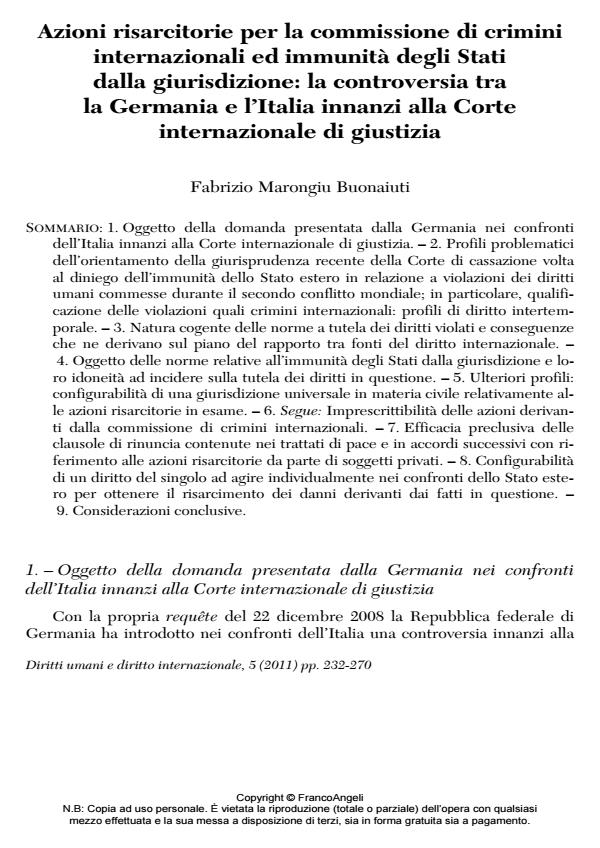Actions for Compensation for International Crimes and Jurisdictional Immunities of the State: Germany v. Italy Before the ICJ
Journal title DIRITTI UMANI E DIRITTO INTERNAZIONALE
Author/s Fabrizio Marongiu Buonaiuti
Publishing Year 2011 Issue 2011/2
Language Italian Pages 39 P. 232-270 File size 395 KB
DOI 10.3280/DUDI2011-002002
DOI is like a bar code for intellectual property: to have more infomation
click here
Below, you can see the article first page
If you want to buy this article in PDF format, you can do it, following the instructions to buy download credits

FrancoAngeli is member of Publishers International Linking Association, Inc (PILA), a not-for-profit association which run the CrossRef service enabling links to and from online scholarly content.
The author comments on the case currently pending before the International Court of Justice between Germany and Italy on the jurisdictional immunities of the State concerning actions for compensation for international crimes committed during the Second World War. The article focuses on the recent case law of the Italian Supreme Court ( Corte di cassazione) which has affirmed an exception to the customary rules on State immunity, due to the higher rank of rules protecting fundamental rights of the person. The author contends that the position maintained by the Corte di cassazione is unpersuasive under various respects. First, for inter-temporal reasons, since the notion of ius cogens was not sufficiently established at the time when the offences were committed. Secondly, even if, for the purposes of jurisdictional immunities, regard were to be had to the rules in force at the moment of the judicial action, it is not sufficiently established that ius cogens norms are likely to prevail not just on conflicting treaties, but on other customary rules as well. Thirdly, the said rules are not conflicting, since their object is different: rules on jurisdictional immunities do not prevent the prosecution of international crimes nor the protection of the fundamental rights involved. Rather, they address the procedural aspect of deciding where the action is to be entertained. Subsequently, the article touches upon other issues addressed by the Corte di cassazione in the said case law, such as the availability of universal jurisdiction concerning these actions, the non-applicability of statutory limitations, the effect of the waiver clauses contained in the peace treaties and in subsequent compensatory agreements, and, ultimately, the existence of an individual right to compensation for international crimes enforceable against foreign States. Concerning the latter, the author concludes that either, as it seems more likely, such a right did not exist at the time of the facts, or, if it then existed, subsequent actions are to be deemed as barred by the said waiver clauses.
- Damages for Violations of Human Rights Graziella Romeo, pp.217 (ISBN:978-3-319-18949-9)
- III. — Index bibliographique 2011 in Revue critique de droit international privé /2012 pp.1100
DOI: 10.3917/rcdip.124.1100
Fabrizio Marongiu Buonaiuti, Azioni risarcitorie per la commissione di crimini internazionali ed immunità degli Stati dalla giurisdizione: la controversia tra la Germania e l’Italia innanzi alla Corte internazionale di giustizia in "DIRITTI UMANI E DIRITTO INTERNAZIONALE" 2/2011, pp 232-270, DOI: 10.3280/DUDI2011-002002